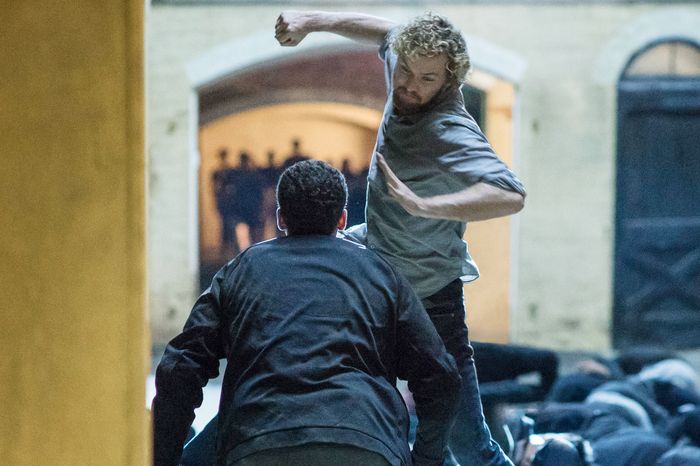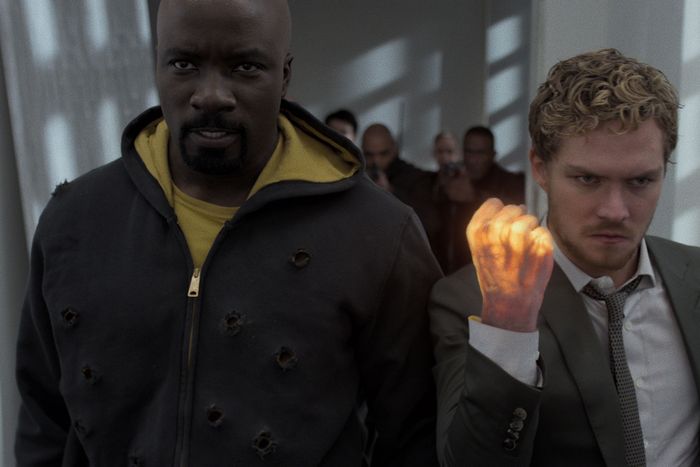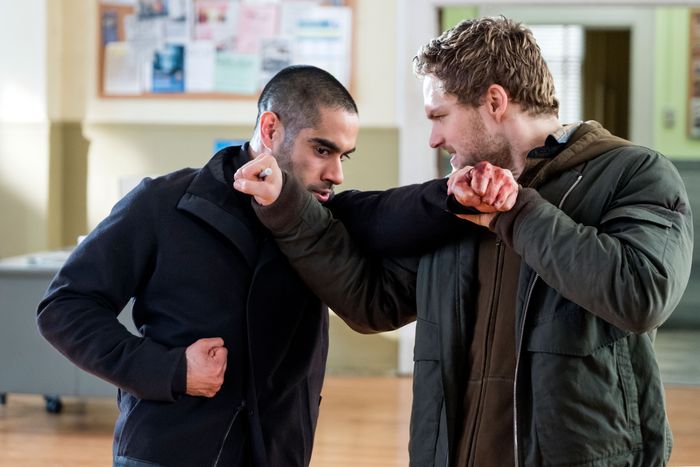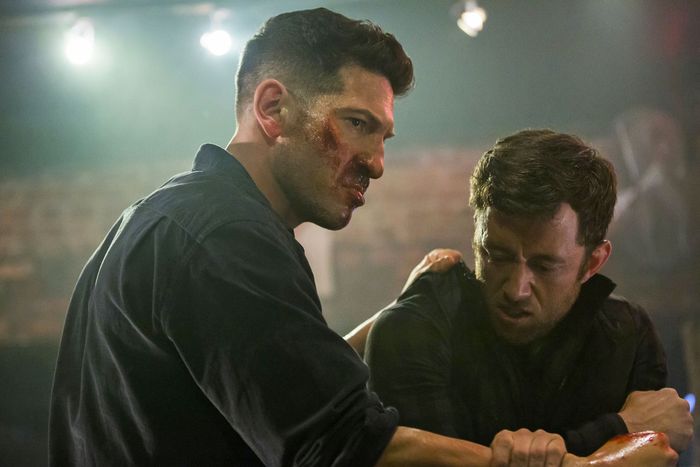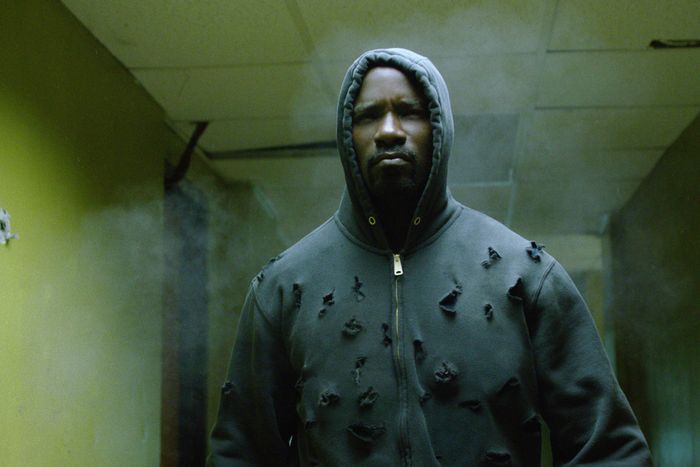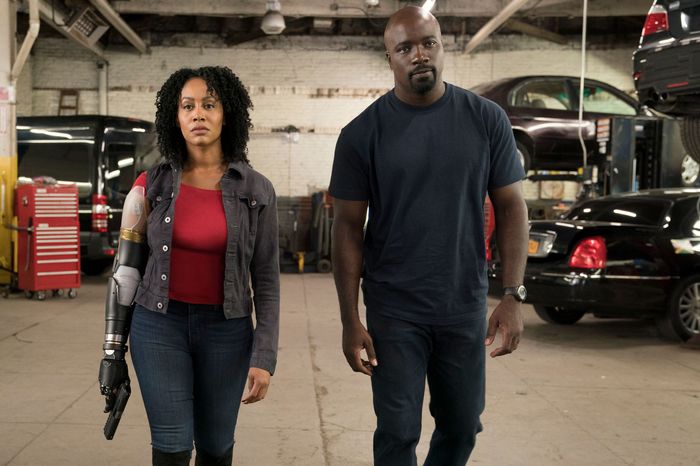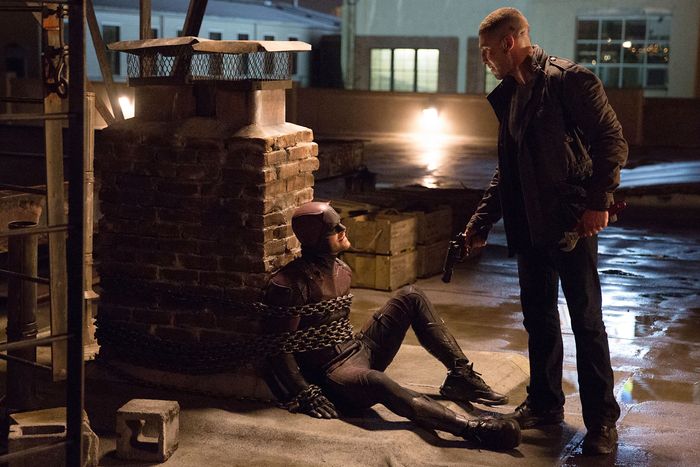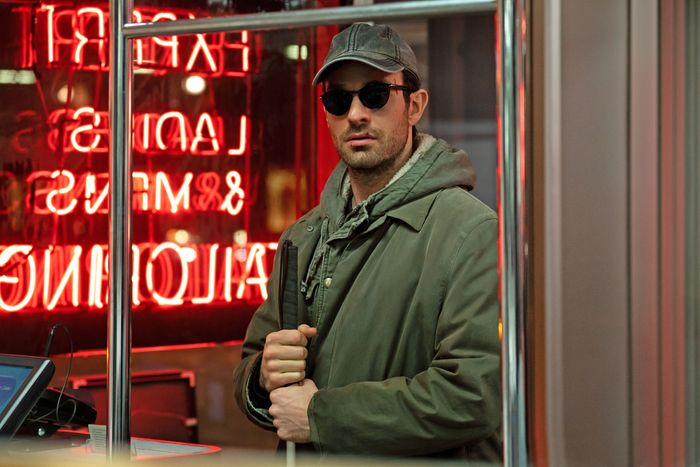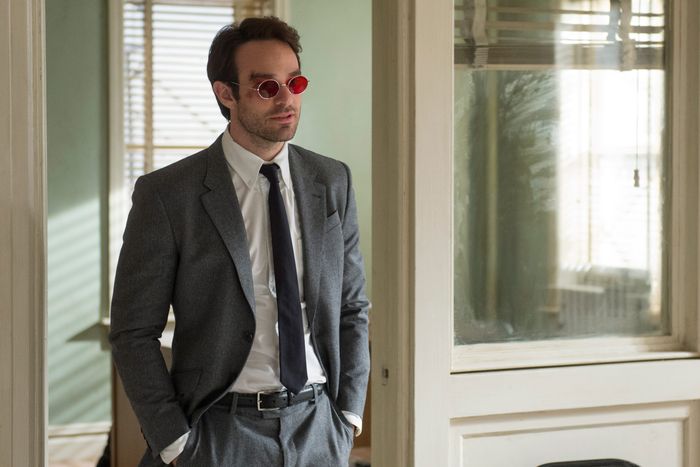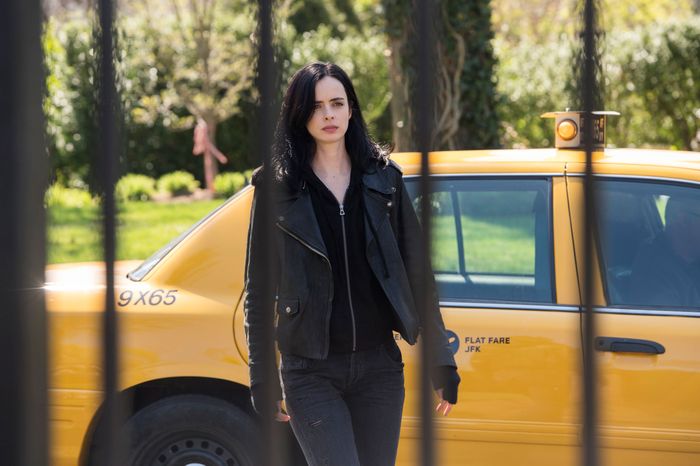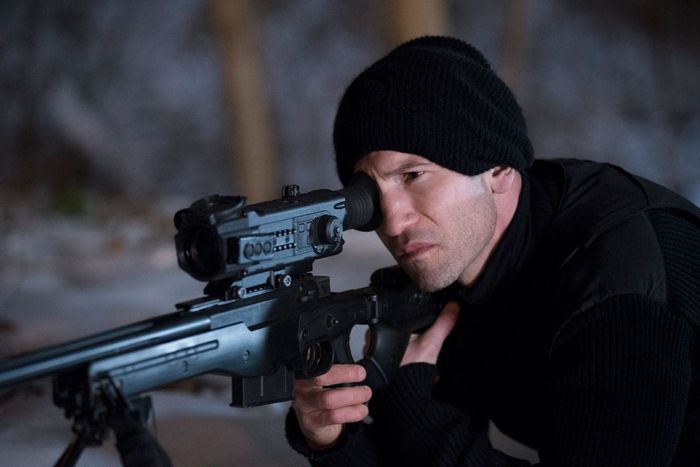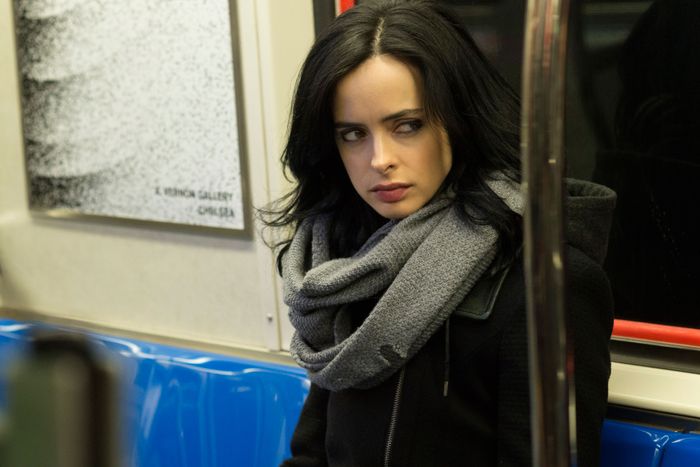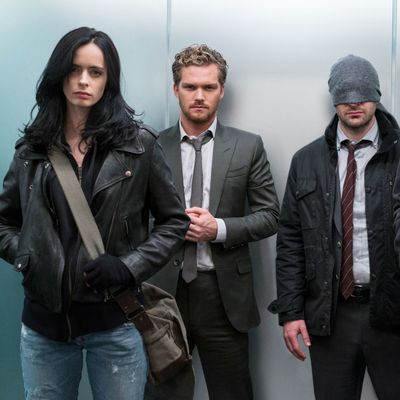
The Marvel era of Netflix is just about over. Weighing in at five shows, one crossover, and a dozen seasons strong (with one more to come), what was envisioned as a small-screen version of the Avengers experiment ended up being haunted by that comparison. While ostensibly set in the Marvel Cinematic Universe, each of these shows effectively exist in a separate world, occasionally referring to each other and only making the occasional Captain America name-drop. Because of this, it really only makes sense to compare them to each other — and compare them we shall, because all Defenders are not created equal.
12. Iron Fist (Season 1)
Easily the nadir of the entire Marvel–Netflix experiment, Iron Fist’s first season tries very few things and fails at nearly all of them. The story of Danny Rand’s return to New York City years after his presumed death starts slow and stays there. An action series with astoundingly poor action coupled with a tepid family drama revolving around Danny’s de facto adoptive family, Iron Fist fails to establish an identity for itself or its hero — who, as played by Finn Jones, comes across as astoundingly unlikable and entitled — and it never grapples with the cultural appropriation inherent in his character’s origin. Pacing and episode length are recurring problems for just about every one of these shows, but it’s most egregious in Iron Fist: You could blindly hack away at entire swathes of it and leave the essential parts intact. If you haven’t seen it yet, there isn’t much reason to catch up.
11. The Defenders (Season 1)
Marvel’s Netflix lineup was largely inspired by The Avengers, and uses the exact same playbook: Introduce four heroes in solo outings, and then have them team up in one big crossover feature. But where The Avengers succeeded in its mission following years of buildup, The Defenders is a disappointment. Although it’s the shortest of the series at just eight episodes, it still suffers from not having enough plot to carry it through — and it’s further hamstrung by how much of that plot is shouldered by Iron Fist, its least interesting character. As fun as it might be to see all four heroes together onscreen, any levity is undercut by an excessively dour plot, as The Hand, a clan of undead ninjas, makes its power play to take over New York. A plot like that should be loads of fun (again: undead ninjas!) but The Defenders is strangely listless and uninventive in its fight scenes — a reminder that, no matter how different each of their individual series are, the Netflix roster of Marvel heroes mostly consists of people in regular clothes punching harder than the average person.
10. Iron Fist (Season 2)
Season two of Iron Fist is an apology. It’s a season that seems less like it’s trying to tell a story of its own, and more like an urgent attempt at course-correction. Among the first tweaks you’ll notice is length: Although its episodes still clock in at 50 minutes on average, season two is only 10 episodes long and feels much better for it. It doesn’t feel like a chore to watch the way the first one did, but it also assumes you’re interested in seeing the show improve, which is a tall order in a field this crowded. If you do watch, you’ll see Iron Fist interrogate the very premise of its first season, stopping again and again to consider if Danny Rand should even be the Iron Fist. The degree to which season two commits to asking this question is fascinating, but the leeway it leaves itself to potentially undermine its answers is frustrating. It’s nine passable episodes in the service of a legitimately interesting finale, but that doesn’t change the fact that this season could’ve started in the exact place it ends.
9. The Punisher (Season 2)
While it’s much more watchable than most of the seasons this far down the list, The Punisher’s second season has a far more tenuous grasp on what it wants to say. After a satisfying, Roadhouse-style start, season two launches Frank Castle (Jon Bernthal) into a conspiracy involving Russian gangsters, religious elites, and his damaged, amnesiac friend turned foe Billy Russo (Ben Barnes). While more evenly paced than most Marvel/Netflix shows, The Punisher season two often feels like it isn’t spending its time well, biting off more than it can chew in its depiction of traumatized people behaving badly (and violently). It’s all in the service of a finale that’s thrilling but also troubling — all the more so because it doesn’t quite seem like the show believes in what it’s saying.
8. Luke Cage (Season 1)
A hip-hop Western with a well-defined sense of style, Luke Cage — the first modern Marvel property with a majority black cast — makes a strong first impression. It’s initial villain, Cornell “Cottonmouth” Stokes is played with casual aplomb by Mahershala Ali, and its emphasis on music — both the score composed by Adrian Younge and Ali Shaheed Muhammad, and the lineup of performers who regularly show up in Stokes’s Harlem Paradise nightclub — give it a vibe that easily stands out from most other Netflix shows. Mike Colter plays Cage with a stoic confidence, and the depiction of his powers is consistently fun to watch. He’s just a big, indestructible dude, casually wrecking stuff without any grace and finesse because he doesn’t need any. Unfortunately, the season slowly undermines everything it has going for it, most notably by pushing aside Stokes in favor of a far less compelling killer named Diamondback (Erik LaRay Harvey). Still, the most damning choice Luke Cage makes in its first season is its reversal of its central metaphor: a hero who is a bulletproof black man in a hoodie. It’s a powerful image, but one that the show undoes after a few episodes by introducing super-bullets.
7. Luke Cage (Season 2)
In its second season, Luke Cage gets more ambitious but also messier. It’s a season that, more so than in its debut year, tries to be about things — many of them compelling. In the aftermath of season one, the cast of characters are all contemplating their personal histories, the history of their communities, and their responsibilities toward said communities. Luke must reconcile with his father; Mariah Dillard (Alfre Woodard) must reconcile her place in Cottonmouth’s criminal empire and her civic-minded ambitions; and Misty Knight (Simone Missick), recovering from the loss of her arm in The Defenders, struggles with her role as a cop and her perception of what justice looks like — all while Jon “Bushmaster” McIver (Mustafa Shakir), a superpowered criminal with a grudge and a burgeoning crime empire of his own, sets his sights on Harlem. That said, season two doesn’t always offer answers as interesting or well-considered as its questions, and the dreaded Netflix bloat underlines the weaknesses that were already showing by the end of season one: Luke, while fun when he’s given room to bounce off other characters, isn’t a terribly compelling lead as written, and the show’s meandering approach to plotting and hour-long episodes can feel interminable. Most of these shows would be better if they were half as long, but Luke Cage season two might have been great.
6. Daredevil (Season 2)
In a truly surprising twist, Daredevil’s second season is almost too entertaining. Now that Matt Murdock (Charlie Cox) is a full-fledged superhero, the show throws two threats at him: Frank Castle (Jon Bernthal), a.k.a. the Punisher, who’s waging a lethal, one-man war on New York’s gangs; and Elektra Natchios (Elodie Yung), Murdock’s college flame returned as a deadly ninja just as the mysterious Hand clan begins to make itself known in New York. The season is more interested in the latter because it sets up The Defenders, even though the show is at its most compelling when it gets personal — i.e., having the Punisher and Elektra getting inside Matt’s head. Unfortunately, those two plotlines really don’t intersect much, and much of the philosophical debate between Castle and Murdock never rises above amateur nihilism. A messy season caught between two masters, Daredevil’s second year gives into excess so quickly that by the time you reach the end, you’ll need to keep reminding yourself what you liked so much about it.
5. Daredevil (Season 3)
What’s strange about Daredevil’s third season is how it’s more of a follow-up to the first than the one that precedes it. It makes sense: The series’ final 13 episodes are an attempt to regain the kind of focus it had at its start. Not only is Vincent D’Onofrio back as Wilson Fisk, but the season also builds out a compelling origin story for a new villain, Benjamin “Bullseye” Poindexter (Wilson Bethel). Unfortunately, this leaves Matt Murdock (Charlie Cox) feeling relatively flat in comparison, undergoing a crisis of faith as the world thinks him dead following The Defenders — and a slowly sprung trap enveloping him as his enemies realize he is not. Despite easily having the most impressively choreographed action of any season on this list, Daredevil’s third season can’t maintain any sort of momentum, and its charismatic villains only serve to underscore what its heroes lack.
4. Daredevil (Season 1)
The 13 episodes that kicked off Netflix’s corner of the Marvel Cinematic Universe weirdly feel like relics, despite only being three years old. In the time since, our pop-cultural obsession with antiheroes and tortured men has largely grown stale, but in spite of this, Daredevil retains a measure of its appeal — and it’s all thanks to Vincent D’Onofrio as Wilson Fisk. With one notable exception, there hasn’t been a villain this memorable in the entire Marvel–Netflix slate. D’Onofrio portrays the Kingpin with a level of menace and control that’s utterly magnetic. It helps that the show backs him up, giving Fisk a level of depth that sometimes overshadows the show’s actual protagonist. Daredevil’s first year has a lot of the same flaws that its sister shows consistently exhibit — episodes that stop the plot dead for the thinnest of reasons, writing that makes overtures toward Big Important Ideas but lacks much in the way of depth — but its muted ambitions and the steady parallel growth of both its hero and villain make them far more palatable here.
3. Jessica Jones (Season 2)
It’s not immediately apparent what Jessica Jones is out to do in its second season. It starts at an excruciatingly slow pace, and it doesn’t seem to have a villain. Stick with it, though, and you’ll see that it’s telling an ambitious story about the rage that follows trauma, and the struggle to be a complete person in spite of it. It’s a story that, while it struggles in the absence of a clear villain, doesn’t really need one. Granted, season two continues to have the blind spots of season one — for instance, how women of color barely factor into the show’s world — but within its lane, Jessica Jones gives viewers much more to chew on than most of its sister series, and Krysten Ritter remains the best casting decision ever made in this corner of the MCU.
2. The Punisher (Season 1)
Green-lighting The Punisher seemed like a lazy, cynical idea. Rushed into production almost immediately after the character’s debut in Daredevil season two and premiering a year later, it was a show that was hard to feel confident about — mostly because the Punisher is an inherently difficult character to depict in a serious, non-satirical way that wouldn’t come across as gratuitous. Somehow, The Punisher pulls it off, largely by sidestepping the titular character. As played by Jon Bernthal, Frank Castle isn’t on an endless war against criminals, but the people who made him. In exploring that, The Punisher becomes a story about the ways the military breaks men and then abandons them, tracing the damaged paths of four men — Castle, private military founder William Russo (Ben Barnes), discharged Marine grunt Lewis Wilson (Daniel Webber), and the hacker Micro (Ebon Moss-Bachrach) — as they navigate trauma and inevitably collide. The Punisher doesn’t always seem to have the strongest understanding of its own material — a lot of it reads as a potent critique of toxic masculinity, but it’s not clear that the writers intend that — yet it’s an impressive feat considering how wrong it all could have gone.
1. Jessica Jones (Season 1)
If the low point of the Marvel–Netflix Universe is obvious, so is its high point: Jessica Jones’s first season remains far and away the best collection of episodes in the whole endeavor. Self-contained, focused, and terrifying, Jessica Jones has a clear, harrowing purpose to the story it’s trying to tell, and a villain perfectly suited to its telling. David Tennant’s portrayal of Kilgrave, a man with the power to make people do whatever he tells them, is downright chilling, and Krysten Ritter’s performance as the damaged, furious P.I. who must confront her former abuser is quietly powerful. There’s some bloat — a three-episode stretch toward the end could probably be cut entirely — but in spite of this, Jessica Jones succeeds as a dark psychological thriller that delivers on every front, and works tremendously well as a stand-alone series. If you only watch one season on this list, make it this one.


